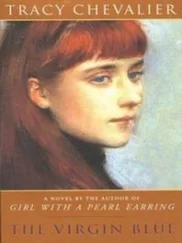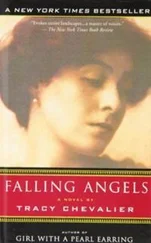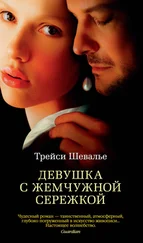James Goodenough was a sensible man, but apples were his weakness. They had been since he was a child and his mother had given him sweet apples as a special treat. Sweetness was a rare taste, for sugar cost dear; but an apple’s tart sweetness was almost free since, once planted, apple trees took little work. He recalled with a shudder their first years in the Black Swamp without apples. He hadn’t realized till he had to go without for over three years how large a part apples had played in his life, how he craved them more than whiskey or tobacco or coffee or sex. That first autumn when, after a lifetime of taking them for granted, James finally understood that there would be no apples to pick and store and eat, he went into a kind of mourning that surprised him. His desperation even drove him to pick the tiny fruit from a wild apple tree he came across along one of the Indian trails; it must have grown from a settler’s discarded apple core. He could only manage three before the sourness forced him to stop, and his stomach ached afterwards. Later, over near Perrysburg, he shamed himself by stealing from a stranger’s orchard, though he took only one apple, and it turned out to be a spitter rather than an eater. He ate it anyway.
In subsequent years he bought more trees from John Chapman-seedlings this time-and grew his own from seeds as well. Trees grown from seeds usually produced sour apples but, as James liked to point out to whoever would listen, one in ten tended to turn out sweet. Like growing anything in the Black Swamp, it took time for the apple trees to thrive, and even those that seemed healthy could easily die over the winter. While the Goodenoughs did have apples within three years of their arrival, they could not be relied on. Sometimes the crop was heavy; other times the apples were scarce and tiny. Sometimes disease killed the trees. For several years James struggled to get thirty trees to grow, much less fifty. More recently he’d had more success, and the previous fall had picked apples from forty-seven trees. Over the winter, however, it appeared nine had died, like a punishment for his hubris.
Luckily no one ever came around to count how many trees they had, as it was too hard to get in and out of the Black Swamp for law officials to bother. None of his few neighbors seemed concerned about the fifty-trees rule. Sadie was amused by the number, and enjoyed taunting her husband with it. Sometimes she would whisper “fifty” to him as she passed. But James fretted over it, always expecting someone to show up on the river or along one of the Indian trails that crisscrossed the Black Swamp and inform him that his farm was no longer his.

I never wanted to live in the Black Swamp. Who would? It aint a name that draws you in. You get stuck there, more like-stuck in the mud and cant go no farther, so you stay cause theres land and no people, which was what we were lookin for. James was second youngest of six healthy sons, so there werent but a little bit of Goodenough farm in Connecticut for us. We managed for a time but James kept reachin for me at night and the children kept comin. Then his father, an old killjoy who never liked me, started hintin about us moving west where we could settle more land. He got the wives of James brothers to talk to their husbands, which they were glad to do cause they didnt like me either. They didnt trust me round their men. I got something they didnt have. So the brothers started pushin James to be more adventurous than he was. Really they shouldve gotten James brother Charlie to go west. Charlie Goodenough was the youngest and by tradition he was the one shouldve gone. Plus he had the gumption in him. Charlie wouldnt of let mud trap him in the swamp. Hed have bust through it and got out into the open where theres good healthy land solid under your feet, with sun and grass and clean water. But everybody loved Charlie, his wife most of all. It was she took against me the worst. Maybe she had reason to. Damned if she werent the nicest of the wives too.
Then all of a sudden Charlie also said James ought to go-though he looked real sorry when we did leave. Stood longer than the rest, watchin our wagon go down the long track away from the Goodenough farm. I bet he wished it was him beside me headin towards a new life.
Turns out lots of Connecticut farmers had gone to Ohio before us. Too many. We went across New York then took a boat on the lake from Buffalo to Cleveland and started lookin, expectin our pick of land to be laid out before us like a nicely made bed, but all we found were other Yankees-most of them war veterans got their allotment from the government. We made a circle round Cleveland, then heard we was better off goin west to the Maumee River, and even into Indiana. After Lower Sandusky we was headed towards Perrysburg when the road-if you can call it that-got worse and worse. That road was where we met our first enemy. Mud. I never saw anything stick so much. It stuck to the wagon wheels and when they turned they collected more mud like a ball of snow gettin bigger and bigger. Got so we had to stop the wagon every fifty feet to scrape it off. Near broke the horses legs. Finally they wouldnt budge and we had to wait till they recovered. Next day we got half a mile before they stopped again. Along that stretch of road there were inns every quarter mile for all the travelers gettin stuck. The inns themselves were set up by settlers who couldnt get no further.
At last we got to the Portage River and decided that was it, we couldnt go no farther so it looked like wed arrived at our Promised Land. By then everything was covered in mud. Wed been wadin through it and couldnt get it off our boots or off our dresses or out from under our toenails. Sometimes the boys would take off their trousers at night and in the morning theyd be standin up by themselves with the mud dried on em. Had to live with it, and wash in the river. John Chapman was a smart one with his canoe glidin up and down the rivers and creeks easy as you like, stayin out of the mud.
After a time we got used to it. Maybe I jest stopped carin. Id hear new settlers complain bout the mud and think, Theres worse things than mud. Jest you wait.
We arrived in the swamp in early April which is a good time to settle cept theres a rush to plant crops and a garden and build a house. And to do any of those things you first got to clear the trees. They was another enemy waitin for us in the Black Swamp. Oh, there were a lot of enemies there.
Damn them trees. I hate em, God love me I do. Back east we didnt have the tree problem the way we did in Ohio. James and I both grew up on farms that had been made some time before, with houses and barns built and cleared fields and gardens. My mother even had flower beds. Thered been settlers in Connecticut for two hundred years, and theyd been the ones breakin their backs to dig up the trees. Every garden, every field, every churchyard and road had to be made by takin out the trees. Wasnt till we was faced with a slice of land full of Ohio trees that we realized how much work we had to do. Well, James had to do, and the older children. I was carryin Robert in my belly and was too big to use an axe or haul wood or pull at those goddamn stumps. There sure wasnt gonna be any flower beds in the Black Swamp. Any clearin had to be done for a better reason than flowers. It was for feedin you and keepin you warm and dry.
Clearin took so much out of my children that sometimes I think thats what killed Jimmy and Patty, weakened em so the swamp fever got em that much easier. Patty died the first summer, Jimmy the next. I never forgave the trees for that, and never will. If I could Id gladly burn down these woods.
Even when we thought wed cleared all the trees we needed to, they kept growin and growin, pressin in on us. We had to keep an eye out for the seedlings that sprung up everywhere. It reminded me of dirty pots or dirty clothes: you scrub and scrub and get em clean, then an hour later youve burnt oatmeal on the bottom of the pot or smeared mud on your apron, and you realize it never ends, theres always gonna be pots and laundry to do. Trees are the same, you clear a field and they start springin up again. At least theyre slower than laundry. But you think youre payin attention, then a year goes by and you find you overlooked a seedling and suddenly its a tree, with roots that dont want to come out.
Читать дальше
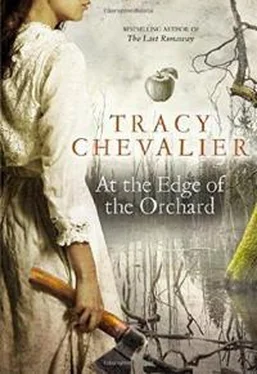


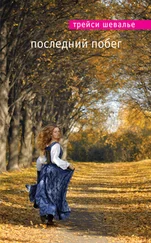

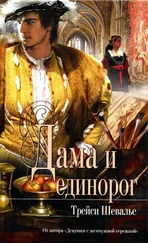
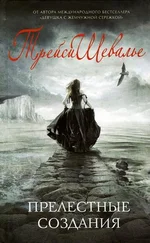
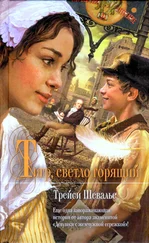
![Трейси Шевалье - Тонкая нить [Литрес]](/books/386177/trejsi-shevale-tonkaya-nit-litres-thumb.webp)
